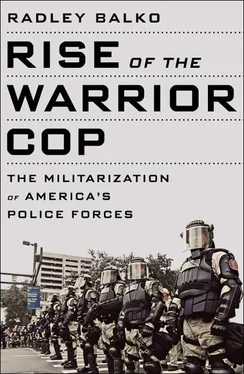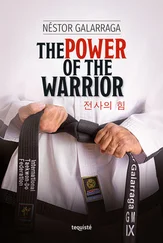And so here we are. The wrong-door raid has now been normalized to the point where it can be parodied in a viral Internet commercial for a search engine.
The Numbers
 Number of drug raids in New York City in 1994: 1,447
Number of drug raids in New York City in 1994: 1,447
… in 1997: 2,977
… in 2002: 5,117
 Approximate number of raids each year by the Toledo, Ohio, SWAT team, as of 2008: 400
Approximate number of raids each year by the Toledo, Ohio, SWAT team, as of 2008: 400
 Percentage of towns between 25,000 and 50,000 people with a SWAT team in 1984: 25.6 percent
Percentage of towns between 25,000 and 50,000 people with a SWAT team in 1984: 25.6 percent
… in 1990: 52.1 percent
… in 2005: 80 percent
 Approximate number of SWAT raids in the United States in 1995: 30,000
Approximate number of SWAT raids in the United States in 1995: 30,000
… in 2001: 45,000
… in 2005: 50,000–60,000
 Total number of federal agencies employing law enforcement personnel in 1996: 53
Total number of federal agencies employing law enforcement personnel in 1996: 53
… in 2008: 73
 Total number of federal law enforcement officers as of 1996: 74,500 (28 per 100,000 citizens)
Total number of federal law enforcement officers as of 1996: 74,500 (28 per 100,000 citizens)
… in 2008: 120,000 (40 per 100,000 citizens)
 Number of SWAT teams in the FBI alone in 2013: 56
Number of SWAT teams in the FBI alone in 2013: 56
 Unlikely federal agencies with SWAT teams: US Fish and Wildlife Service, Consumer Product Safety Commission, National Aeronautics and Space Administration, Department of Education, Department of Health and Human Services, US National Park Service, Food and Drug Administration
Unlikely federal agencies with SWAT teams: US Fish and Wildlife Service, Consumer Product Safety Commission, National Aeronautics and Space Administration, Department of Education, Department of Health and Human Services, US National Park Service, Food and Drug Administration
 Value of surplus military gear received by Johnston, Rhode Island, from the Pentagon in 2010–2011: $4.1 million
Value of surplus military gear received by Johnston, Rhode Island, from the Pentagon in 2010–2011: $4.1 million
 Population of Johnston, Rhode Island, in 2010: 28,769
Population of Johnston, Rhode Island, in 2010: 28,769
 Partial list of equipment given to the Johnston police department: 30 M-16 rifles, 599 M-16 magazines containing about 18,000 rounds, a “sniper targeting calculator,” 44 bayonets, 12 Humvees, and 23 snow blowers 105
Partial list of equipment given to the Johnston police department: 30 M-16 rifles, 599 M-16 magazines containing about 18,000 rounds, a “sniper targeting calculator,” 44 bayonets, 12 Humvees, and 23 snow blowers 105
CHAPTER 9

REFORM
There is no crueler tyranny than that which is perpetuated under the shield of law and in the name of justice.
—CHARLES DE MONTESQUIEU
Cheye Calvo only intended to be home long enough to grab a bite to eat and walk his dogs. 1Calvo worked full-time at an educational foundation in Washington, DC, but he also had an unusual part-time job: he was mayor of the small town of Berwyn Heights, Maryland. In 2004, at age thirty-three, he was the youngest elected mayor in the history of Prince George’s County, Maryland. Now thirty-seven, he lived with his wife, Trinity Tomsic, her mother, Georgia Porter, and their two black labradors, Payton and Chase. Calvo was due back in town later that night for a community meeting.
As Calvo took the dogs out for a walk the evening of July 29, 2008, his mother-in-law told him that a package had been delivered a few minutes earlier. He figured it was something he had ordered for his garden. “On the walk, I noticed a few black SUVs in the neighborhood, but thought little of it except to wave to the drivers,” he would later recall. When Calvo and the dogs returned, he picked up the package, brought it inside, then went upstairs to change for his meeting.
The next thing Calvo remembers is the sound of his mother-in-law screaming. He ran to the window and saw heavily armed men clad in black rushing his front door. Next came the explosion. He’d later learn that this was when the police blew open his front door. Then there was gunfire. Then boots stomping the floor. Then more gunfire. Calvo, still in his boxers, screamed, “I’m upstairs, please don’t shoot!” He was instructed to walk downstairs with his hands in the air, the muzzles of two guns pointed directly at him. He still didn’t know it was the police. He described what happened next at a Cato Institute forum six weeks later. “At the bottom of the stairs, they bound my hands, pulled me across the living room, and forced me to kneel on the floor in front of my broken door. I thought it was a home invasion. I was fearful that I was about to be executed.” I later asked Calvo what might have happened if he’d had a gun in his home for self-defense. His answer: “I’d be dead.” In another interview, he would add, “The worst thing I could have done was defend my home.”
Calvo’s mother-in-law was face-down on the kitchen floor, the tomato-artichoke sauce she was preparing still sitting on the stove. Her first scream came when one of the SWAT officers pointed his gun at her from the other side of the window. The police department would later argue that her scream gave them the authority to enter the home without knocking, announcing themselves, and waiting for someone to let them in.
Rather than obeying the SWAT team demands to “get down” as they rushed in, Georgia Porter simply froze with fear. They pried the spoon from her hand, put a gun to her head, and shoved her to the floor. They asked, “Where are they? Where are they ?” She had no idea what they were talking about. She told them to look in the basement. She would later tell the Washington Post , “If somebody puts a gun to your head and asks you a question, you better come up with an answer. Then I shut my eyes. Oh, God, I thought they were going to shoot me next.”
Calvo’s dogs Payton and Chase were dead by the time Calvo was escorted to the kitchen. Payton had been shot in the face almost as soon as the police entered the home. One bullet went all the way through him and lodged in a radiator, missing Porter by only a couple of feet. Chase ran. The cops shot him once, from the back, then chased him into the living room and shot him again.
Calvo was turned around and put on his knees in front of the door the police had just smashed to pieces. He heard them rummaging through his house, tossing drawers, emptying cabinets.
Calvo and Porter were held for four hours. Calvo asked to see a search warrant. He was told it was “en route.” The police continued to search the house. At one point, a detective got excited when she found an envelope stuffed with cash. According to Porter, the detective was deflated when she found only $68 inside and noticed that the front of the envelope read: “Yard Sale.” At one point, Porter overheard a detective call to ask a relative to schedule a veterinary appointment. The sight of the dogs’ bodies apparently reminded her that she need to make an appointment for her own pet.
Even after they realized they had just mistakenly raided the mayor’s house, the officers didn’t apologize to Calvo or Porter. Instead, they told Calvo that they were both “parties of interest” and that they should consider themselves lucky they weren’t arrested. Calvo in particular, they said, was still under suspicion because when armed men blew open his door, killed his dogs, and pointed their guns at him and his-mother-in-law, he hadn’t responded “in a typical manner.”
Trinity Tomsic came home about an hour later to find a blur of flashing police lights and a crowd gathering on her front lawn. She was told that her husband and mother were fine. Then she was told that her dogs were dead. She broke down in tears. When she was finally able to enter her home, she found her dogs’ blood all over her house. The police had walked through the two large pools of blood that collected under Payton and Chase, then tracked it all over the home. Even once the police realized they had made a mistake, they never offered to clean up the blood, to put the house back together, or to fix the front door.
Читать дальше

 Number of drug raids in New York City in 1994: 1,447
Number of drug raids in New York City in 1994: 1,447











